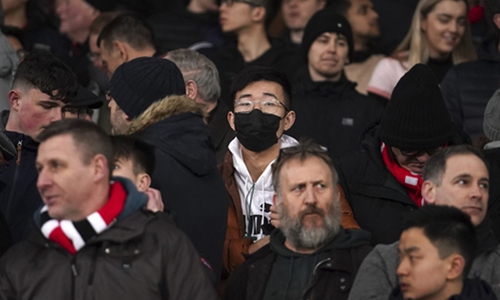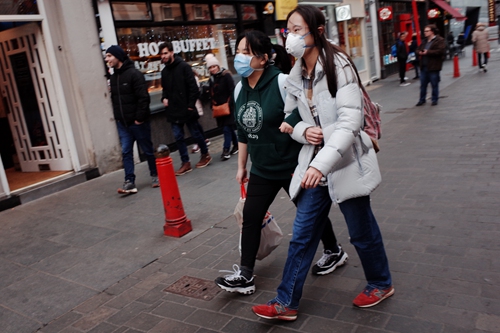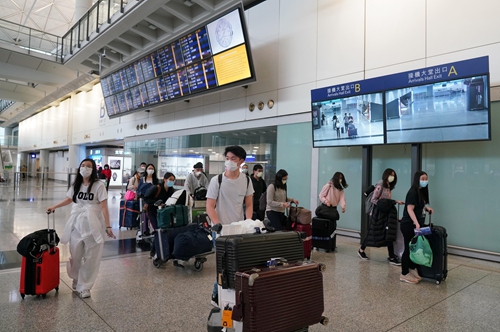HOME >> CHINA
Outbreak of hate
By Hu Yuwei and Li Qiao Source:Global Times Published: 2020/3/24 0:45:23 Last Updated: 2020/3/24 20:45:23
Escalation in virus-related racial abuse leaves overseas Chinese students traumatized

Photo: Xinhua
Escalated racial abuse against Chinese people amid the coronavirus crisis across the world has left many overseas Chinese students traumatized, said psychological experts. Overseas Chinese students, especially those studying in the US and Europe, live in fear of assault as US President Donald Trump persists in calling COVID-19 the "Chinese virus."
Many of the Chinese students the Global Times reached said that their lives abroad have become a mess full of xenophobia and racism related to the novel coronavirus pandemic.
Blatant attacks
Chinese students in Europe and the US have repeatedly reported verbal abuse, physical harassment and being refused services across many regions, with some public officials even advising Asian students to stay at home to avoid attack.
A New York-based Chinese woman, who preferred not to be named, told the Global Times that when she drove and stopped at a red light, several people spat at her car window. One of the men shouted out "F**king virus Chinese," after she tried to identify the harassers. "It made me really sick," she said.
The woman said robberies targeting Chinese shops or restaurants increased after Trump called COVID-19 the "Chinese virus," leaving many Chinese afraid to go out into the streets alone.
Many analysts and overseas Chinese said Trump's racial epithets aim to avoid US domestic resentment and dissatisfaction toward his mishandling of the pandemic.
The Trump administration's high-profile criticism of China in dealing with the pandemic is intended to shift domestic public concerns to the outside, and to create pressure against China in international public opinion, said Li Mingjiang, an associate professor at S. Rajaratnam School of International Studies, Nanyang Technological University in Singapore, quoted by Lianhe Zaobao

Two women wearing face masks walk on Gerrard Street in Chinatown in London, the UK on March 10. There were 6,650 confirmed cases of COVID-19 in the UK as of Tuesday noon, 335 dead, according to the UK National Health Service. Photo: AFP
"Many [Chinese] began to stockpile bullets and exchange legal rules and techniques on gun use in WeChat groups, in order to protect themselves against sudden attacks," she said. "However, unarmed overseas students are the most vulnerable group."
Some anti-Chinese verbal attacks with white nationalist rhetoric are increasingly seen on social media, said the woman, adding that one of her friends received an unidentified online message telling him to "go back to China with your coronavirus."
"After Donald Trump declared New York a 'major disaster area,' looting and mayhem broke out in crowded areas such as Manhattan," a Chinese student pursuing a master's degree in Long Island told the Global Times. "What I'm most afraid of is not an epidemic itself, but the abuse brought by racism, which is scarier."
Similar attacks were also seen in Australia on March 19 when two Chinese students at the University of Tasmania were assaulted in Melbourne while being taunted about the novel coronavirus pandemic.
Mark Holgate, an Australian tutor, said he was "ashamed to be Australian" after sharing that one of his Chinese students had been badly injured and almost lost an eye amid increased racial violence, media reported.
"Our country has an ugly history of racism… the coronavirus is just another excuse that's stirring up racist violence," Holgate said in a Facebook post on February 24.
The Consulate General of China in Melbourne strongly condemned acts of hatred against Chinese and urged local police to protect the legitimate rights of Chinese people.
Racial abuse also appears in some European countries. Liu Xin, 22, who studies at King's College London, shared an experience she went through at a supermarket.
"I visited Sainsbury's to stock up on food for the next week with my suitcase, and three black women burst out laughing and started taking pictures of me as I stepped out of the elevator," Liu told the Global Times on Sunday.
Many Chinese students who had just arrived in Western countries voiced their depression and alienation by mainstream society due to misunderstandings and conspiracy theories around the COVID-19 outbreak.
"I spent thousands of pounds and flew thousands of miles to study here, but it's totally different to what I had expected. It's so sad that we are deemed Yellow Peril," commented a Chinese student studying in the UK on Sina Weibo after learning that a 23-year-old Singapore man of Chinese ethnicity was punched, kicked and sustained facial injuries in an attack by four people in London.
Psychologists warned of post-traumatic stress disorder for some young overseas students caused by the hate crimes and abuse during their study abroad, calling for more support, especially through social and political measures.
"The psychological harm caused by discriminations over COVID-19 is for sure a noteworthy problem considering younger students' fragile ability to endure the hatred," Wang Jikun, an associate professor of psychology at East China Normal University in Shanghai, told the Global Times. Wang's university has opened a hotline for Chinese students to provide psychological support against such troubles, and she expects to see more similar assistance in other Western countries.
Maskaphobia attacks
Face masks have surfaced as another pretext racists in some Western countries have used. Many overseas Chinese students endured anti-Chinese mockeries and hatred as a result of so-called maskaphobia in some regions.
Many of my classmates believe that only sick people wear masks, and healthy people who wear them bring mass panic in the community, Huang Qiufen, a bachelor student studying in the UK, told the Global Times.
"Some universities sent emails to tell students not to wear masks. But Chinese students like me were caught in a dilemma as we believe it is necessary to wear masks to prevent ourselves from the already serious pandemic, but we also fear being targeted or attacked by some racists," said Huang.

Passengers arrive at Hong Kong International Airport from London, the UK on March 18, including many students of British universities from Hong Kong and the Chinese mainland. Photo: cnsphoto
Before the outbreak in the UK became serious, Liu Xin had already donned a mask every day. But last week when she was in a metro station in London, a man ran over and coughed at Liu, with an obvious purpose of teasing or embarrassing people who wear masks.There was a protest against "maskaphobia" and racism against Chinese, East and Southeast Asians in Trafalgar Square in London on February 16. Liu didn't participate, but she hopes such protests can help in the fight against discrimination.
Hate crimes have pushed overseas students to stand together to protect themselves by setting up WeChat groups to warn each other, to find perpetrators who've been attacking Asians, and sometimes to recruit companions when running errands.
Many Chinese students also joined the hashtag #JeNeSuisPasUnVirus, which means "I'm not a virus" in French, to share their own stories, encourage the victims to speak out and rally support.
Posted in: IN-DEPTH